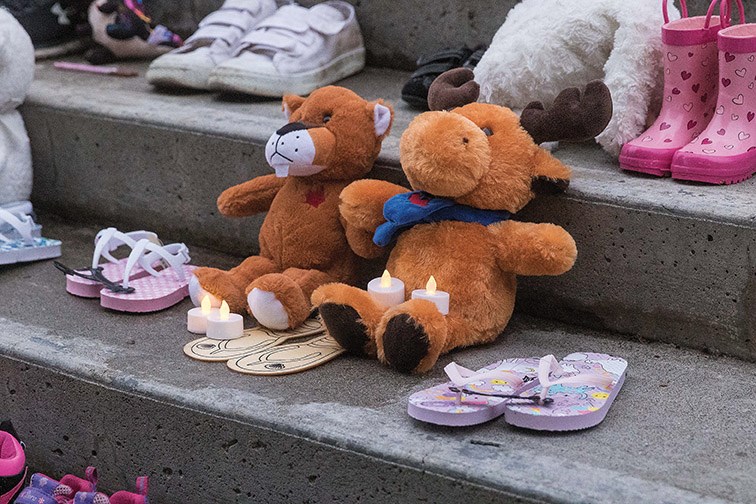Outrage, anger, frustration, and potentially fueling hate. Why would we cancel celebrations around Canada Day? We all know why. Deep down, everyone in this country knows why this conversation is happening now.
With the work of radar-penetrating technology beginning to unravel the history many Indigenous Peoples knew, this is the time to cool off on celebrating a country built upon racist colonial ideals. Original reports from the Truth and Reconciliation Commission revealed 6,000 children perished at Indian Residential Schools. However, retired Senator, Murray Sinclair, claims this number could be within the 15-25,000 range.
I remind you, these are children who never returned home. This is a bitter cup of tea to swallow for many Canadians but alas, it remains a temporary inconvenience for those who have and continue to benefit from colonization. You are angry now, yes, I encourage you to remember that Indigenous Peoples and Communities have been angry about their children being forcibly removed as far back as 130 years only to be replaced by an equally devastating child welfare system. Let’s not forget the 1960s, which were rife with mass abductions of children placed with non-Indigenous families around the world. Yes, the 60s scoop was another part of the puzzle of assimilation targeting the destruction of Indigenous families and their culture. Assimilation is a tool of colonization and it was used frequently without justification or remorse.
Colonization at its very foundation is moving into a space and cultivating to eventually inhabit. The etymology (origin) of the word colonization is derived from a combination of the Latin words: 1) “colere” (to cultivate), 2) “colonia” (a landed estate), and 3) “colonus” (tiller of soil; farmer/ to inhabit). Colonization specifically refers to the act of moving to a new area and inhabiting it so as to achieve a colony. This was done in our territories despite consequences and without remorse. If there was remorse for violent acts of assimilation with the overarching goal of colonization, we would not be here in 2021 beginning the sickening task of finding unmarked children’s graves at so-called schools designed to assimilate them into people they were not intended to be.
Not intended to be - this line reminds me of Aristotle in his Nicomachean Ethics in which he speaks about Eudamonia. Eudamonia is something to be achieved or to aspire to – to be happy and to be well you must live to your true daimon/true self. If someone is prevented from achieving eudemonia, they will not experience happiness or health, they will suffer trauma, experience lack of self-continuity/cultural continuity (the ability to see yourself and your culture progress to the future), and live a life questioning who they really are. So you see, even long dead philosophers knew what we needed to be happy, and still… colonialism pushes forward. Worse yet, we demand the people suffering a collective soul wound to move on, get over it, or pull up your boot straps. Can I ask you to get over it too? Get over the blind pride in your country for a moment to see the bones upon which your lives sit upon? It does not mean you are wrong, but it does mean that you want to be better.
What you may be learning now with recent media coverage on the horrific discovery of children’s bodies buried in unmarked spaces at the Kamloops Residential School, is that “colonization” was violent, traumatic, and left many questions unanswered. It is okay to only be learning this true history now. Much of our school curriculum continues to catch up with our own history. We are all left with a painful legacy which brings the new challenge of framing reconciliation. For the Indigenous Peoples who grew up with the stories you are only witnessing now for the first time, these stories are about our parents, aunts, uncles, Grandparents, and Great-Grandparents. It is okay to engage with this history now. Be gentle with your emotions, choose your words carefully, and remember the ancestors of those children walk among us, they are us. If you are angry about cooling down your Canada Day celebrations, I beg you to take a moment and reflect. What can you celebrate this year when children’s bodies are being discovered? When families are coping with answers to their disappeared loved ones? And when you have an opportunity, reflect on how you came to be Canadian.
What is Canada Day if not a celebration of colonization? We are not asking you to cancel Canada Day forever, to feel guilt or shame of what ancestors did, or to hate your country. We are asking you to stand beside Indigenous Peoples while we collectively mourn and create a better future for everyone. If this move angers you, I encourage you to ask yourself why holding off Canada Day celebrations manifests that emotion for you. I think we can take some inspiration from Victoria and Penticton which have already asked for Canada Day celebrations to be on hold this year. We all need space to reflect on what Canada Day really means. This is not cancel culture, this is what keeping space for collective healing looks like. If your response is “get over it”, then I beg the same of you so we can work together.
- Jessie King, Hadiksm Gaax (Swimming Raven) is an assistant professor in the First Nations Studies department at UNBC and a member of the T'symsen Nation with maternal ties to Gitxaala.



